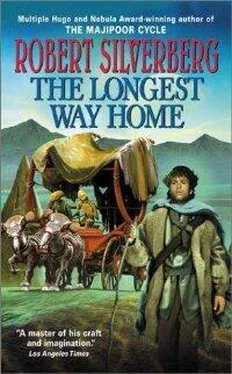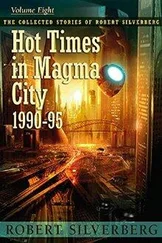Joseph waited close to an hour for the refugees to finish going past. Then, when the last few stragglers had disappeared and the road was empty, he sprinted across, heedless of the protests of his aching leg, and plunged into the heavy tangle of brush on the other side.
The hour was growing late and he was starting to think about finding a safe nest in which to spend the upcoming day when he realized that someone or something was following him.
He was aware of it, first, as a seemingly random crashing or crunching in the underbrush to his rear. That was, he supposed, some animal or perhaps several, moving about on their nightly rounds. Since it was reasonable to expect the forest to be full of wild creatures, and since none of them had presented any threat to him so far, he did not feel any great alarm.
But then, when he halted at a swift little brook to refill his flask with fresh water, he noticed that the crashing sounds had ceased; and when he resumed his march, the sounds were resumed also. After ten minutes he stopped again, and the sounds stopped. He started, and immediately the sounds began again. A foraging animal would not behave that way. But these were not the sounds that any human who might be pursuing him would make, either, for no serious attempt at concealment was being made. Something—something big , Joseph began to think, and probably not very bright—was crashing blithely through the underbrush behind him, tramping along in his wake, matching him step for step, halting when he halted, starting up again when he started.
He had nothing that could serve very well as a weapon: just his flimsy walking-stick, and the little cutting-tools in his utility case, which only a fool would try to use in hand-to-hand combat. But perhaps he would not need any weapon. The rhythmic pattern of the footsteps behind him—crash crash , crash crash , crash crash —made it seem more likely that his follower was a two-legged creature than some low-slung brutish beast of the forest. If there was any truth whatever to Thustin’s tale of there being an Indigene village down this way, he might well have entered its territory by now, and this might be a scout from that village, skulking along behind him to see what this human interloper might be up to.
Joseph turned and stared back into the darkness of the forest through which he had just come. He was fairly sure that he could hear the sound of breathing nearby: slow, heavy breathing.
“Who’s there?” Joseph asked, saying it in the Indigene tongue.
Silence.
“I call for an answer,” Joseph said crisply, still using Indigene. He spoke with the unmistakable tone of a Master. Perhaps that was a mistake, he thought, but there was no helping it now. An Indigene would not care whether he was Master or Folk, anyway.
But still no answer came. He could still hear the sound of hoarse breathing, though. No question about that, now. “I know you’re there,” said Joseph. “I call on you to identify yourself to me.” Only a Master would have spoken that way, and so, when the silence continued, he said it again in Master-speech, to underscore his rank. Then, for good measure, he repeated the words in Folkish. Silence. Silence. He might just as well have called out to the creature in the language of Old Earth, he realized. Joseph had studied that language under Balbus’s tutelage and after a fashion could actually speak a little of it.
Then he remembered that there was a pocket torch in his utility case. He groped around for it, drew it out, and switched it on, putting it on widest beam.
A looming massive noctambulo stood before him, no more than twenty feet away, blinking and gaping in the light.
“So you’re what’s been following me,” Joseph said. He spoke in Indigene. He knew that in his home district that was a language noctambulos were capable of understanding. “Well, hello, there.” One did not fear noctambulos, at least not those of Helikis. They were huge and potentially could do great damage as they blundered about, but they were innately harmless. “What is it you want with me, will you tell me?”
The noctambulo simply stared at him, slowly opening and closing its long rubbery beak in the silly way that noctambulos had. The creature was gigantic, eight feet tall, maybe nine, with a narrow spindling head, thick huddled shoulders, enormously long arms that culminated in vast paddle-shaped outward-turned hands. Its close-set red eyes, glistening like polished garnets in the diffuse light of Joseph’s torch, were saucer-sized. Its body was covered with broad, leathery pinkish-yellow scales. The noctambulos of Helikis were a darker color, almost blue. A regional difference, Joseph thought. Perhaps this was even a different species, though obviously closely related.
“Well?” Joseph said. “Will you speak to me? My name is Joseph Master Keilloran,” he said. “Who are you?” And, into the continuing silence: “I know you can understand me. Speak to me. I won’t harm you. See? I have no weapons.”
“The light—” said the noctambulo. “In my eyes—” Its voice sounded rusty. It was the clanking sound of a machine that had not been used for many years.
“Is that it,” Joseph said. “How’s this, then?” He lowered the beam, turning it at an angle so he could continue to see the noctambulo without blinding it. The great shambling being flapped its loose-jointed wrists in what might have been a gesture of gratitude.
The noctambulos of Helikis were stupid creatures, just barely across the threshold of intelligence, and there was no reason to think that those of Manza were any cleverer. But they had to be treated as something more than mere animals. They were capable of speaking Indigene, however poorly and inarticulately, and they had some sort of language of their own besides. And they had definite self-awareness, undeniable consciousnesses. Two apiece, indeed, for noctambulos, as their name implied, were creatures that prowled by night, but also remained active during their daytime sleep periods, and, insofar as Joseph understood it, had secondary identities and personalities that came into operation by day while the primary identity that inhabited their brains was sleeping. How much communication existed between the day and night identities of each noctambulo was something that no one had been clearly able to determine.
Intelligence had developed differently on Homeworld than it had on Earth: instead of one dominant species that had subjugated all others, Homeworld had several sorts of native races that qualified as intelligent, each of which had a language and the ability to form abstract concepts and even art of a kind, and the members of which had distinct individual identities. The race known as Indigenes, though they were more nearly humanoid in appearance than any of the others and were undoubtedly the most intelligent, had never shown any impulse toward dominance whatsoever, so that they could not really be regarded as the species that had ruled this world before the first humans came. No one had ruled this world, which had made it much easier for the firstcomers, the humans now known as the Folk, to take possession of it. And, since the Folk had been lulled to placidity after having lived here so long without any hint of challenge from the native life-forms, that had perhaps made it such an easy matter for the second wave of humans, the conquering Masters, to reduce them to a subordinate position.
Since the noctambulo did not seem to want to explain why it had been following Joseph through the woods, perhaps did not even know itself, Joseph let the point pass. He told the creature, speaking slowly and carefully in Indigene, that he was a solitary traveler searching for a nearby village of Indigenes where he hoped to take refuge from trouble among his own people.
Читать дальше












